Pain relief is a significant concern for many individuals, and natural remedies are gaining popularity. Among these remedies, certain mushrooms have shown promising potential in alleviating pain. This article explores the best mushrooms for pain relief, backed by scientific studies and traditional use.
Quick Summary
- Lion’s Mane: Known for its neuroprotective properties.
- Reishi: Has anti-inflammatory and analgesic effects.
- Cordyceps: Enhances energy and reduces fatigue.
- Chaga: Rich in antioxidants, it helps in reducing inflammation.
- Turkey Tail: Supports immune health, indirectly aiding in pain relief.
Why Try Mushroom Supplements for Pain Relief
Safety and Minimal Side Effects
One of the key advantages of mushroom supplements is their safety profile. Most medicinal mushrooms are well-tolerated and have been used for centuries in traditional medicine with minimal reported side effects. A study published in the Journal of Traditional and Complementary Medicine confirmed that medicinal mushrooms, such as Reishi and Cordyceps, are generally safe for long-term use . This makes them an attractive option for individuals looking to manage pain without the risks associated with pharmaceutical drugs.
Anti-Inflammatory Properties
Mushrooms like Reishi, Chaga, and Turkey Tail are known for their potent anti-inflammatory effects. Chronic inflammation is a common underlying factor in many pain conditions, including arthritis, fibromyalgia, and neuropathy. By reducing inflammation, these mushrooms can help alleviate pain at its source. A study in the International Journal of Medicinal Mushrooms highlighted the significant anti-inflammatory effects of various medicinal mushrooms, demonstrating their potential as natural pain relievers (source).
Neuroprotective Benefits
Certain mushrooms, such as Lion’s Mane, offer neuroprotective benefits that can be particularly useful in managing neuropathic pain. Lion’s Mane contains compounds that stimulate nerve growth factor (NGF) production, which supports nerve regeneration and repair. This can help reduce pain associated with nerve damage. Research published in the Journal of Agricultural and Food Chemistry found that Lion’s Mane extracts promoted the growth and repair of nerve cells, offering a promising natural therapy for neuropathic pain (source).
Immune System Support
A strong immune system is crucial for overall health and can play a significant role in pain management. Mushrooms like Turkey Tail and Reishi boost immune function, helping the body combat inflammation and heal more effectively. Polysaccharides in these mushrooms enhance the activity of immune cells, improving the body’s response to pain and inflammation. A study in the International Journal of Biological Macromolecules demonstrated the immune-enhancing effects of polysaccharides derived from medicinal mushrooms, supporting their use in pain management.
Antioxidant Protection
Oxidative stress is a major contributor to chronic pain and inflammation. Mushrooms such as Chaga are rich in antioxidants, which help neutralize free radicals and protect cells from damage. This antioxidant protection can reduce pain and improve overall health. The high levels of melanin, superoxide dismutase, and other antioxidants in Chaga have been shown to significantly lower oxidative stress levels, as evidenced by research published in the Pharmaceutical Biology journal.
Long-Term Health Benefits
Incorporating mushroom supplements into your daily routine not only helps manage pain but also offers long-term health benefits. These supplements support various bodily systems, including the immune, nervous, and cardiovascular systems. They contribute to overall well-being, making them a valuable addition to a comprehensive health regimen.
Lion’s Mane (Hericium erinaceus)
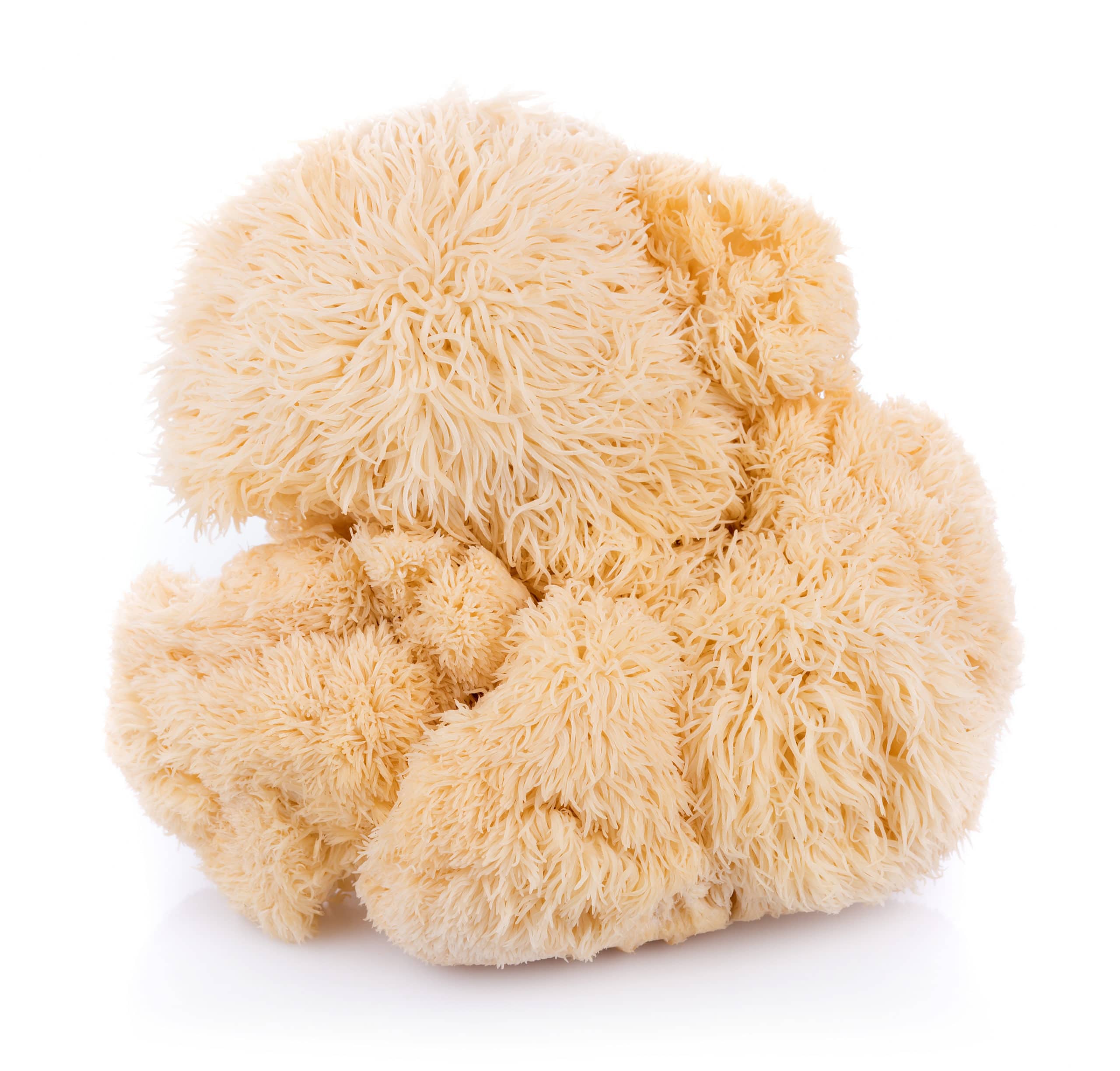
Benefits for Pain Relief
Lion’s Mane mushrooms are renowned for their neuroprotective and anti-inflammatory properties, making them a powerful natural remedy for pain relief. This section explores the multiple ways Lion’s Mane can help manage pain and promote nerve health.
Neuroprotective Properties
Lion’s Mane contains unique compounds known as hericenones and erinacines, which have been shown to stimulate the synthesis of nerve growth factor (NGF). NGF is crucial for the growth, maintenance, and survival of neurons. By promoting NGF production, Lion’s Mane supports nerve regeneration and repair, which is particularly beneficial for conditions involving nerve damage and neuropathic pain. A study published in the International Journal of Medicinal Mushrooms found that Lion’s Mane extract significantly increased NGF levels, enhancing nerve regeneration and function.
Anti-Inflammatory Effects
Inflammation is a common underlying factor in many pain conditions, including arthritis, neurodegenerative diseases, and chronic pain syndromes. Lion’s Mane has potent anti-inflammatory properties that help reduce inflammation and associated pain. Research has shown that Lion’s Mane can inhibit the production of pro-inflammatory cytokines, thereby mitigating inflammation. A study in the Journal of Agricultural and Food Chemistry demonstrated that Lion’s Mane extract significantly reduced inflammation in animal models, supporting its use in managing inflammatory conditions.
Cognitive Function and Mood Improvement
Chronic pain often affects cognitive function and mood, leading to issues such as brain fog, anxiety, and depression. Lion’s Mane has been shown to improve cognitive function and enhance mood by supporting brain health. The neuroprotective effects of Lion’s Mane help maintain cognitive clarity and reduce symptoms of anxiety and depression, which can indirectly help in managing pain. A study published in Biomedical Research found that participants who consumed Lion’s Mane reported significant improvements in cognitive function and mood compared to a placebo group.
How to Use Lion’s Mane
Lion’s Mane mushrooms can be consumed in various forms, each providing unique benefits and convenience:
Supplements
Lion’s Mane supplements, available in capsule or tablet form, offer a convenient way to incorporate this beneficial mushroom into your daily routine. Supplements often contain standardized extracts, ensuring a consistent dose of active compounds.
Powders
Lion’s Mane powder can be mixed into a variety of foods and beverages, such as smoothies, coffee, or soups. This form is versatile and allows for easy incorporation into daily meals. The powder retains the mushroom’s neuroprotective and anti-inflammatory properties.
Culinary Dishes
Lion’s Mane mushrooms can also be used in cooking, providing both culinary delight and health benefits. They have a meaty texture and can be used in a variety of recipes, such as stir-fries, soups, and pasta dishes.
Reishi (Ganoderma lucidum)
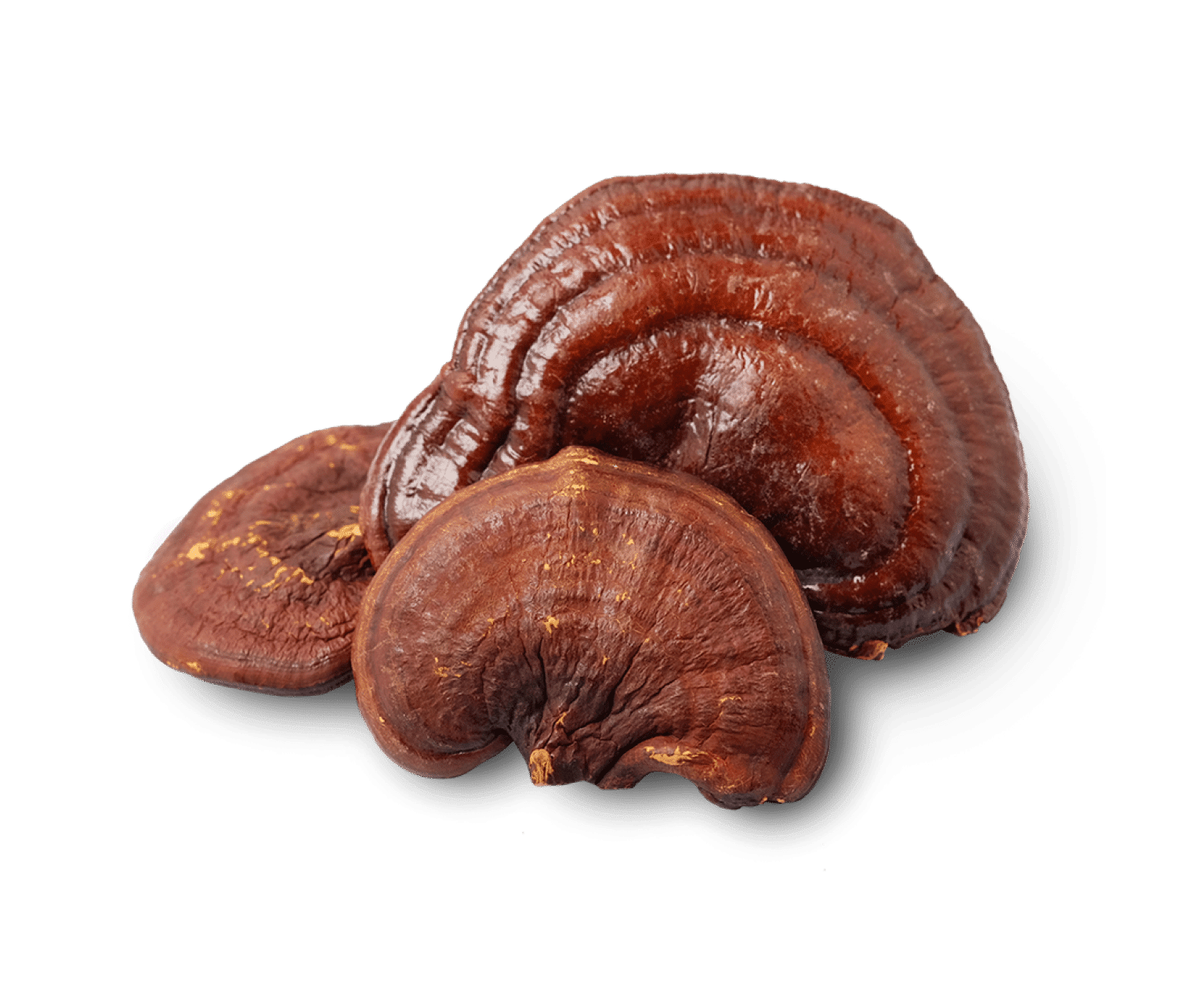
Benefits for Pain Relief
Reishi mushrooms are celebrated for their anti-inflammatory and analgesic effects. They contain several bioactive compounds, including triterpenes, polysaccharides, and peptidoglycans, which contribute to their therapeutic properties.
Anti-Inflammatory Properties
One of the primary benefits of Reishi mushrooms is their ability to reduce inflammation. Triterpenes found in Reishi have been shown to inhibit the release of pro-inflammatory cytokines, which are signaling molecules that promote inflammation in the body. By reducing these cytokines, Reishi can help alleviate inflammation-related pain. Studies have indicated that the anti-inflammatory effects of Reishi can be beneficial in managing conditions such as arthritis and other chronic inflammatory diseases.
Analgesic Effects
Reishi mushrooms also possess analgesic properties, making them effective in pain management. Research has demonstrated that Reishi can reduce pain sensitivity and provide relief in various pain models. The analgesic effects are partly due to Reishi’s ability to modulate the central nervous system, thereby altering pain perception. In a study published in the Journal of Ethnopharmacology, Reishi extracts were found to significantly reduce pain in animal models, highlighting their potential as a natural painkiller.
Immune System Modulation
In addition to their direct pain-relieving properties, Reishi mushrooms support overall immune health, which can indirectly aid in pain management. A robust immune system can better handle inflammation and pain. Polysaccharides in Reishi are known to enhance immune function by promoting the activity of natural killer cells and macrophages, which play a crucial role in the body’s defense mechanisms.
How to Use Reishi
Reishi mushrooms can be consumed in several forms, each offering unique advantages:
Extracts
Reishi extracts are concentrated forms of the mushroom, providing a potent dose of its active compounds. Extracts are typically available in liquid or capsule form and are convenient for those seeking a high concentration of Reishi’s beneficial properties.
Powders
Reishi powder can be mixed into beverages such as coffee, tea, or smoothies. This form is versatile and allows for easy incorporation into daily routines. It can also be added to recipes, providing an additional health boost to meals.
Teas
Traditional Reishi tea is made by boiling the dried mushroom in water for an extended period. This method extracts the beneficial compounds into a drinkable form. Reishi tea has a bitter taste, which can be balanced with natural sweeteners or herbs.
Cordyceps (Cordyceps militaris)
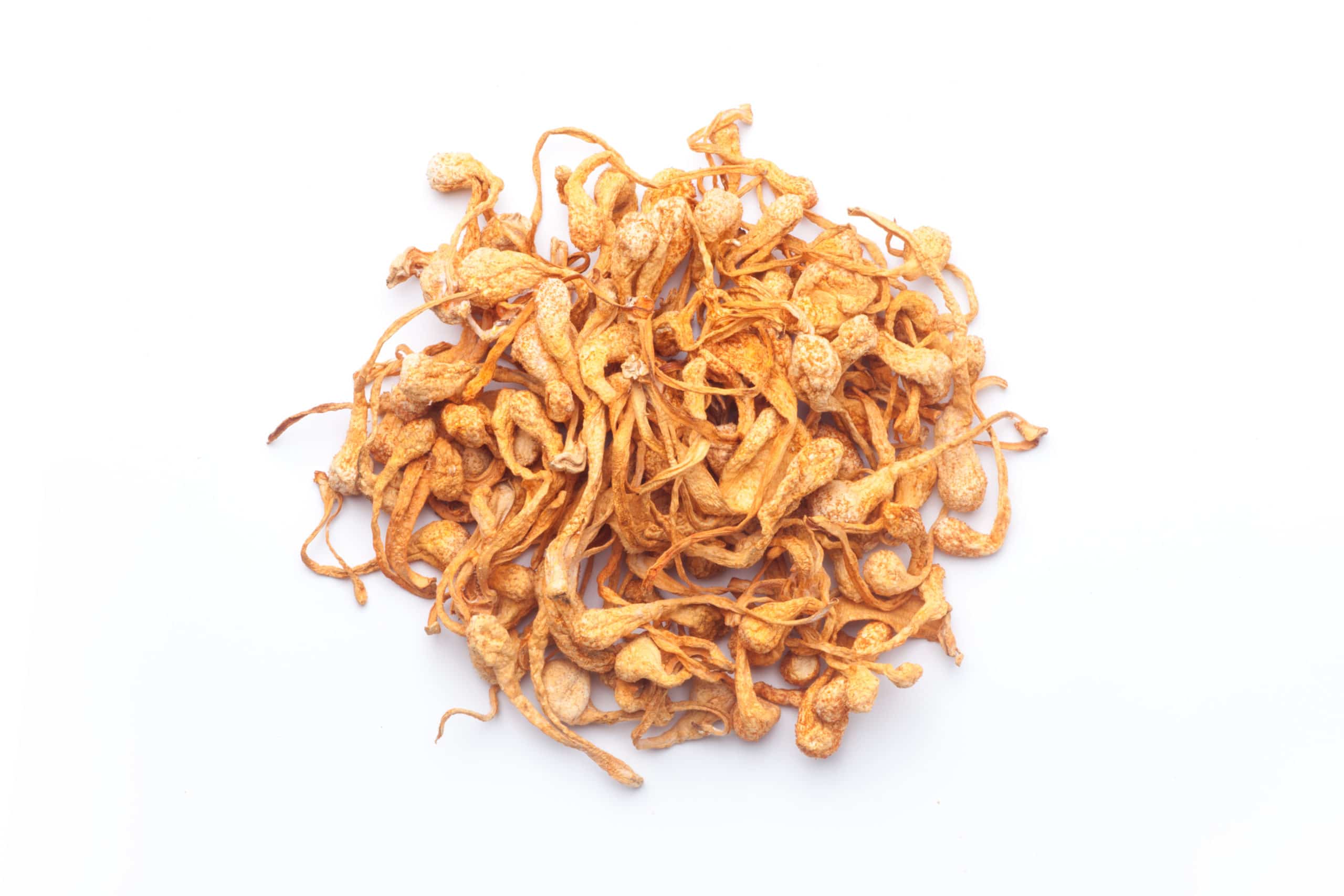
Benefits for Pain Relief
Cordyceps mushrooms are renowned for their unique ability to enhance energy levels, reduce fatigue, and improve overall vitality. These benefits can indirectly contribute to pain relief by supporting the body’s natural resilience and energy production mechanisms.
Enhancing Energy Levels
Cordyceps are known for their ability to improve cellular energy production. This is primarily due to their impact on adenosine triphosphate (ATP) levels, the energy currency of the cell. Increased ATP production can lead to enhanced physical performance and reduced fatigue. A study published in the Journal of Alternative and Complementary Medicine found that supplementation with Cordyceps significantly improved exercise performance and energy metabolism in healthy adults.
Reducing Fatigue
By enhancing oxygen utilization and increasing ATP production, Cordyceps mushrooms help reduce fatigue. This can be particularly beneficial for individuals suffering from chronic pain, where fatigue is a common symptom. Improved energy levels can lead to better physical activity and overall quality of life. Research published in the Chinese Journal of Integrative Medicine demonstrated that Cordyceps supplementation reduced fatigue and improved the physical performance of elderly participants.
Anti-Inflammatory Properties
Cordyceps also possess anti-inflammatory properties, which are crucial for pain management. The bioactive compounds in Cordyceps, such as cordycepin, have been shown to reduce the production of pro-inflammatory cytokines. This reduction can alleviate pain associated with inflammation. A study in the Journal of Ethnopharmacology highlighted the anti-inflammatory effects of Cordyceps in animal models, showing significant reductions in inflammatory markers.
How to Use Cordyceps
Cordyceps mushrooms can be consumed in various forms, each offering unique benefits:
Capsules
Cordyceps capsules provide a convenient and consistent way to incorporate these mushrooms into your daily routine. Capsules often contain standardized extracts, ensuring a reliable dosage of active compounds.
Powder
Cordyceps powder is versatile and can be added to a variety of foods and beverages. It can be mixed into smoothies, soups, or even coffee, making it easy to incorporate into daily meals.
Extracts
Cordyceps extracts are highly concentrated forms of the mushroom, offering a potent dose of its beneficial compounds. These extracts can be taken in liquid form or mixed with other liquids for easy consumption.
Chaga (Inonotus obliquus)
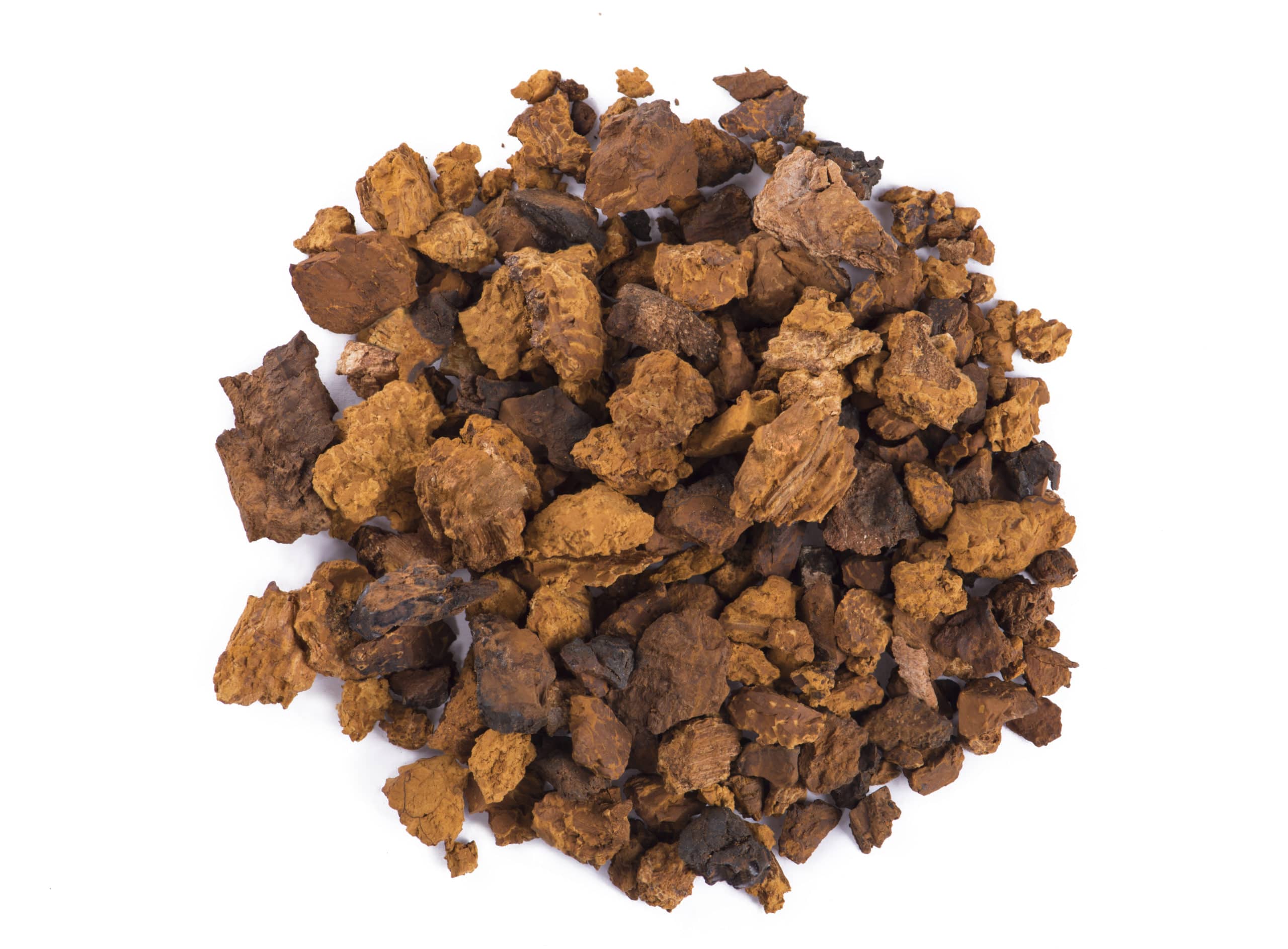
Benefits for Pain Relief
Chaga mushrooms are highly valued for their rich antioxidant content and potent anti-inflammatory properties. These attributes make them a promising natural remedy for pain relief.
Antioxidant Properties
Chaga mushrooms are one of the most antioxidant-rich foods available. Antioxidants play a crucial role in reducing oxidative stress, which can contribute to chronic inflammation and pain. The high concentration of polyphenols, melanin, and superoxide dismutase (SOD) in Chaga helps neutralize free radicals and protect cells from damage. A study published in the International Journal of Medicinal Mushrooms demonstrated that Chaga extract exhibited significant antioxidant activity, comparable to that of synthetic antioxidants.
Anti-Inflammatory Effects
Chaga’s anti-inflammatory effects are largely attributed to its betulinic acid content, which is derived from the birch trees on which Chaga grows. Betulinic acid has been shown to inhibit the production of pro-inflammatory cytokines, thereby reducing inflammation and pain. Research published in the Journal of Ethnopharmacology highlighted the anti-inflammatory potential of Chaga, showing a marked reduction in inflammation in animal models.
Immunomodulatory Effects
Chaga also supports the immune system, which can indirectly help in managing pain. By modulating immune responses, Chaga can help the body better cope with inflammatory conditions. Polysaccharides in Chaga enhance the activity of macrophages and natural killer cells, crucial components of the immune system. A study in the Mycobiology journal found that Chaga extract significantly stimulated immune responses in mice.
How to Use Chaga
Chaga mushrooms can be consumed in various forms to leverage their health benefits effectively:
Tea
Chaga tea is one of the most traditional and popular ways to consume this mushroom. It is made by steeping Chaga chunks or powder in hot water for an extended period. This method extracts the beneficial compounds into a drinkable form. Chaga tea has a pleasant, earthy flavor that can be enhanced with natural sweeteners or other herbs.
Extracts
Chaga extracts are concentrated forms that provide a potent dose of its active compounds. These extracts are typically available in liquid form and can be taken directly or added to beverages. Extracts offer a convenient way to incorporate Chaga into a daily health regimen.
Powder
Chaga powder is versatile and can be mixed into a variety of foods and drinks. It can be added to smoothies, coffee, or even baked goods, making it easy to include Chaga in everyday meals. Powdered Chaga retains its antioxidant and anti-inflammatory properties, providing a convenient option for regular use.
Turkey Tail (Trametes versicolor)
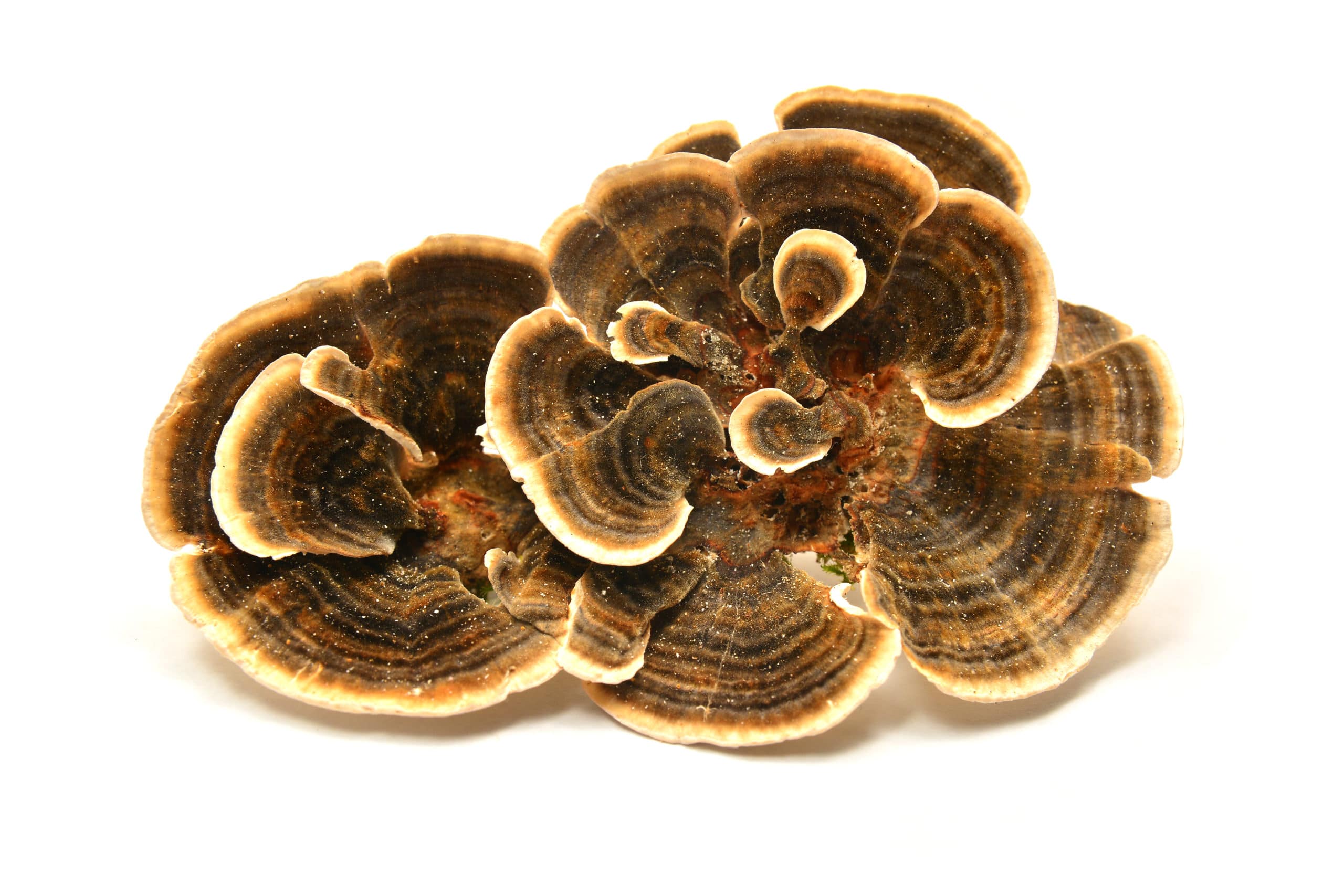
Benefits for Pain Relief
Turkey Tail mushrooms are well-regarded for their immune-boosting and anti-inflammatory properties, making them an excellent natural remedy for pain relief. This section delves into the various ways Turkey Tail can help manage pain and improve overall health.
Immune System Support
Turkey Tail mushrooms are rich in polysaccharopeptides, such as PSK (polysaccharide-K) and PSP (polysaccharopeptide), which are known to enhance immune function. A robust immune system is crucial for managing pain and inflammation, as it helps the body respond effectively to stressors and infections. Research published in the Journal of Clinical Oncology found that PSK improved immune function and survival rates in cancer patients, highlighting its potent immunomodulatory effects.
Anti-Inflammatory Effects
The anti-inflammatory properties of Turkey Tail are well-documented. These mushrooms contain bioactive compounds that inhibit the production of pro-inflammatory cytokines, thereby reducing inflammation and associated pain. A study in the International Journal of Molecular Sciences demonstrated that Turkey Tail extract significantly reduced inflammatory markers in animal models, supporting its use in managing inflammatory conditions.
Antioxidant Properties
Turkey Tail mushrooms are also rich in antioxidants, which help neutralize free radicals and reduce oxidative stress. Oxidative stress is a major contributor to chronic inflammation and pain. The antioxidants in Turkey Tail, such as phenols and flavonoids, protect cells from damage and support overall health. Research in the Antioxidants journal highlighted the potent antioxidant activity of Turkey Tail, confirming its role in reducing oxidative stress and inflammation.
How to Use Turkey Tail
Turkey Tail mushrooms can be consumed in various forms to leverage their health benefits effectively:
Tea
Turkey Tail tea is a traditional and popular way to consume these mushrooms. It is made by boiling dried Turkey Tail slices or powder in water for an extended period. This method extracts the beneficial compounds into a drinkable form. Turkey Tail tea has a mild, earthy flavor that can be enhanced with natural sweeteners or other herbs.
Extracts
Turkey Tail extracts are concentrated forms that provide a potent dose of its active compounds. These extracts are typically available in liquid form and can be taken directly or added to beverages. Extracts offer a convenient way to incorporate Turkey Tail into a daily health regimen.
Capsules
Turkey Tail capsules provide a convenient and consistent way to include these mushrooms in your diet. Capsules often contain standardized extracts, ensuring a reliable dosage of active compounds. This form is ideal for those seeking an easy and portable option.
Conclusion
Incorporating mushrooms like Lion’s Mane, Reishi, Cordyceps, Chaga, and Turkey Tail into your diet can provide effective pain relief through their anti-inflammatory, antioxidant, and neuroprotective properties. Always consult with a healthcare provider before starting any new supplement regimen.
References
- Cai, Zhe, et al. “Anti-Inflammatory Activities of Ganoderma Lucidum (Lingzhi) and San-Miao-San Supplements in MRL/Lpr Mice for the Treatment of Systemic Lupus Erythematosus.” Chinese Medicine, vol. 11, no. 1, 29 Apr. 2016, https://doi.org/10.1186/s13020-016-0093-x. Accessed 21 Mar. 2021.
- Docherty, Sarah, et al. “The Acute and Chronic Effects of Lion’s Mane Mushroom Supplementation on Cognitive Function, Stress and Mood in Young Adults: A Double-Blind, Parallel Groups, Pilot Study.” Nutrients, vol. 15, no. 22, 20 Nov. 2023, pp. 4842–4842, https://doi.org/10.3390/nu15224842.
- Li, I-Chen, et al. “Neurohealth Properties OfHericium ErinaceusMycelia Enriched with Erinacines.” Behavioural Neurology, vol. 2018, 2018, pp. 1–10, https://doi.org/10.1155/2018/5802634.
- Park, Yoo Kyoung, et al. “Chaga Mushroom Extract Inhibits Oxidative DNA Damage in Human Lymphocytes as Assessed by Comet Assay.” BioFactors, vol. 21, no. 1-4, 2004, pp. 109–112, https://doi.org/10.1002/biof.552210120.
- Patel, Dinesh K., et al. “Mushroom-Derived Bioactive Molecules as Immunotherapeutic Agents: A Review.” Molecules, vol. 26, no. 5, 4 Mar. 2021, p. 1359, https://doi.org/10.3390/molecules26051359.
- Szućko-Kociuba, Izabela, et al. “Neurotrophic and Neuroprotective Effects of Hericium Erinaceus.” International Journal of Molecular Sciences, vol. 24, no. 21, 1 Jan. 2023, p. 15960, www.mdpi.com/1422-0067/24/21/15960#:~:text=Positive%20effects%20of%20H., https://doi.org/10.3390/ijms242115960.
- Venturella, Giuseppe, et al. “Medicinal Mushrooms: Bioactive Compounds, Use, and Clinical Trials.” International Journal of Molecular Sciences, vol. 22, no. 2, 10 Jan. 2021, p. 634, res.mdpi.com/d_attachment/ijms/ijms-22-00634/article_deploy/ijms-22-00634-v2.pdf, https://doi.org/10.3390/ijms22020634.

